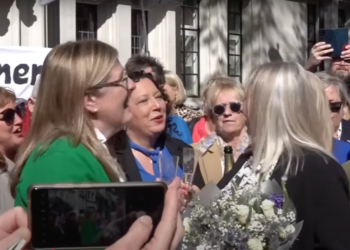We often hear about how society is becoming lonelier. People find life more polarised, more fragmented and fundamentally more splintered. At the heart of that is the decline of the public square.
Society is happier with a strong civic life, fuelled by opportunities to meet different people, and often driven by volunteers. It is why events like the Shreswbury Flower Show have been up and running since 1875 and why Margaret Thrower, a horticulturist and regular attendee, told the BBC as the flower show announced its closure this year:
“It has been my life from the day I was born almost… when I think of the years of history, years of hard work that have gone into producing that show, but not only that, the joy and entertainment it has brought to so many people and what it has brought to Shrewsbury, it is sad.”
The policy choices of Government are, in part, to fault for this – making voluntary initiatives harder with onerous bureaucracy and higher costs. Alongside general rising expenditure, Shrewsbury Town Council cited the impact of Martyn’s Law, a piece of anti-terror legislation which received royal assent this month, as another factor.
Like a lot of legislation named after someone, Martyn’s Law – the Terrorism (Protection of Premises) Bill, requiring all venues with a capacity of more than 200 to have a plan for how they will prevent terrorism – is well-intentioned but provides poor governance, dragging village halls into the fight against terrorism.
I was still living in Manchester at the time of the Arena terror attack in May 2017. I remember hearing the news break on the radio: an Islamic extremist, Salman Abedi, detonated a bomb at an Ariana Grande concert killing 22 and injuring 1,017 people.
The next morning I rushed into the city centre school to see the class of 11-year-old girls I was mentoring and check if any of them, who had planned on a fun-filled evening of joyful singing along to their favourite artist, had been caught in the most gruesome of attacks. Some of them had been, but luckily were physically, at least, unharmed.
The same could not be said for the namesake of Martyn’s Law, the 29-year-old year-old Martyn Hett who had been stood with friends in the foyer of the arena, singing and dancing, and was tragically killed. His mother, Figen Murray, has campaigned for new anti-terror legislation ever since.
Murray’s inconceivable loss is one that naturally inspires sympathy, and the determination of her cause is one that deserves to be admired. It is with good faith and good heart that she has campaigned as she has done.
But it is for government to decide on and create good governance – and even with the best will and intention in the world, this is legislation that does not deal with the core issues the Arena attack put on display, but places onerous and costly responsibilities on small venues that, as one Tory MP tells me, “fundamentally aren’t the targets of terrorists”.
It is legislation, however, that made it into the latest version of the Tory manifesto, and then into the Labour government’s 2024 King’s speech.
“I think it is unfortunate a Conservative government introduced it in the first place,” another Tory MP says. “It was because the family were the ones campaigning, but governments in general are too quick to accept the request of grieving families, because it is obviously very difficult to say: ‘Look, I’m really sorry, but we’re not going to do it.’”
“The thing is, if you keep agreeing to all these things, eventually you get this cumulative effect of regulations and rules getting heaped up and heaped up and heaped up.”
A senior Tory MP highlights that the legislation does little in addressing the real failures that have seen extremists, like Abedi who brought his home-made shrapnel-filled device to Manchester Arena, flourish. “It’s just a waste of time,” they say.
Abedi had managed to spend a year with militants in Libya before coming back to the UK and authorities had been warned about his extremist views. Key state institutions failed in this case, but this legislation does not tackle how they will perform better in the future.
What is needed is a robust Home Office counter-extremism strategy, police reform that promotes accountability and an immigration policy that keeps those who wish us harm outside of the country.
Instead we have a bill that obliges the operators of venues with a capacity of more than 200 people to take a series of bureaucratic steps to secure their buildings against theoretical terrorist attacks, including: 800 village halls, 8,000 sports facilities and 33,000 churches. Their plans will be signed off by the government’s Security Industry Authority – and comes with the threat of a £10,000 fine if you’re not able to present the paperwork.
It would see staff or volunteers at a venue capacity of more than 200 undergo evacuation training, and sites with more than 800 people need extra measures such as CCTV or security staff.
But major venues like the Manchester Arena already have guards and CCTV cameras. Security staff were already trained but failed to intervene, from security guard Kyle Lawler who admitted he had a “bad feeling” about Abedi but didn’t approach him for fear of being branded racist, to the two PCs who drove five-miles for a kebab in a two-hour lunch break while on duty.
“We can’t seem to get our act together on tackling extreme Islamists so instead we’re shoving a whole lot of responsibility on to the lovely volunteers who run the church fete. Make that make sense,” one of the Tory MPs says.
The Home Affairs Select Committee, which was Labour-led at the time of the Bill’s introduction, was scathing about the legislation, saying it had:
“Serious concerns about the proportionality of the Bill, especially in relation to the impact on smaller businesses, voluntary and community-run organisations in the standard tier premises, where there is a lack of evidence that the Bill will adequately reduce the threat of terrorism for smaller organisations.”
One Tory MP flags: “They said don’t do it. Diana Johnson was head of the committee at the time and is policing minister now. So it basically seems that nobody is willing to say no when it comes to it.”
In Rishi Sunak’s first concession speech as interim Leader of the Opposition, they add, he mentioned he was glad to see Martyn’s Law in the King’s Speech – and wanted to see it brought in as soon as possible: “We were all like, why?” It’s mad.”
I understand the new shadow Home Office team are uncomfortable with the effects of Martyn’s Law and have been looking at further ways of raising the threshold above 200, but – as it was introduced by the last government – are unlikely to actively oppose it.
“This Labour government actually made it better by increasing the threshold from 100 to 200,” a Home Office source says.
Even the Tory minister responsible for the Bill at one time, Tom Tugendhat, defended originally having a 100 people lower limit, only to – once out of government – unsuccessfully table an amendment in committee that sought to raise the (already) revised upwards lower limit from 200 to 300.
The government’s cost-benefit ratio is, as one of the Tory MPs says, “bananas”. It estimates that in the best-case scenario, Martyn’s Law will have a net cost of £1.8bn. In the worst-case scenario, it is £4.9bn – i.e. 583 times as much cost as benefits expected.
“Government policy by emotional blackmail,” is how one Tory MP describes it – and it could lead to a perfect storm hitting our public square and civic life.
Two thirds of community centres (62 per cent) responded to the government that Martyn’s Law would damage their “financial ability to operate” with new compliance costs. This comes amid other costly legislation like the Employment Rights Bill, the increase in NICs and uplift in minimum wage.
More than half of village halls and community centres (56 per cent) thought the new requirements would be difficult to take forward due to the burden of time and effort.
If there are so many barriers to the functioning of pubs, football clubs, concert venues, church halls or community centres, it could become so onerous as to not bother going ahead with them running. Why put on big community events if non-compliance could lead to civic or criminal liability? It may well be unlikely to reach that point but it takes one case to set a precedent.
The government’s Community Life Survey suggests that just 16 per cent of people engage in formal volunteering per month, down from 27 per cent 12 years ago. There is a generational divide forming around social participation: over-65s today are nearly three times as likely to say they have six or more close friends than under-25s (14 per cent), according to research from the think tank Onward.
There has been a huge underestimation of the power that a rich social capital provides. If civic life is seen to be crumbling, this may only serve to make things worse.
The state’s resources should be reinforced on a proper footing to counter the terrorism which claimed Martyn Hett’s life.
It should not be directed at potentially harming the very social capital that makes something like a concert so special, because even if the impact to civic life is less tangible, it is very much real.


![NYC Tourist Helicopter Falls into Hudson River, Siemens Executive and Family Among Those Killed [WATCH]](https://www.right2024.com/wp-content/uploads/2025/04/NYC-Tourist-Helicopter-Falls-into-Hudson-River-Siemens-Executive-and-350x250.jpg)





![Red Sox Fan Makes the ‘Catch of the Day’ with Unconventional ‘Glove’ [WATCH]](https://www.right2024.com/wp-content/uploads/2025/04/Red-Sox-Fan-Makes-the-‘Catch-of-the-Day-with-350x250.jpg)
![Green Day’s Cringe Trump Diss Ends in Fire and Evacuation [WATCH]](https://www.right2024.com/wp-content/uploads/2025/04/Green-Days-Cringe-Trump-Diss-Ends-in-Fire-and-Evacuation-350x250.jpg)

![Bikini Clad Spring Breakers Prove Our Education System is Failing Students [WATCH]](https://www.right2024.com/wp-content/uploads/2025/03/Bikini-Clad-Spring-Breakers-Prove-Our-Education-System-is-Failing-350x250.jpg)





